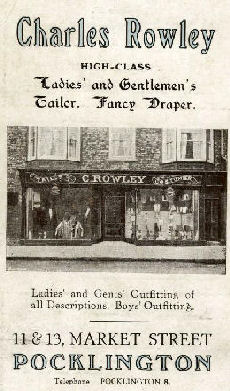 |
Charles Rowley drapers
had the phone number of 8 ! |
Early Telephone Subscribers at Pocklington
In 1962, when I joined Powell & Young, a firm of solicitors in Pocklington, our phone number was 2114. Since the phone at our house was an extension from the office, that was our number too. My then senior partner could well remember the telephone room, where, when he joined the office in the 1930s, an instrument had been housed. In the course of working on old files, I realized that I was looking at the closing stages of a way of life that had gone by the 1960s. When, in the 1920s, Mr H S Powell wrote to a farming client that he would ride out and see him later in the week, he meant just that. He still preferred to ride a horse rather than be driven in a car.
From old letter heads it seemed likely that the firm's number had originally been 14 and I became curious to know when the telephone had arrived in Pocklington and who had been the first subscribers. Like many local historians I have used trade directories, and other population listings, for research on the late 18th century and for the 19th century, so I first turned to the 20th century trade directories but was surprised to find them unhelpful in this respect. I also drew a blank at the York City reference library but BT proved very helpful and from BT Archives and Historical Information Centre I obtained copies of the 1910 and 1911 phone directory for "The Market Weighton Area". (1)
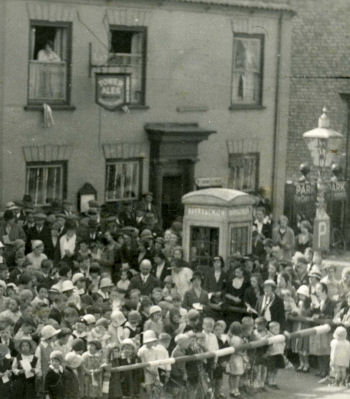 |
1935 Jubilee Celebrations with the Public Telephone box in front of the Black Bull |
From the booklet that BT sent me I found that the Post Office, which by the mid 1880s had a flourishing telegraph network, had given a very cool response to Alexander Bell's invention and that it had been left to private companies to develop a telephone system. The first public exchange, with eight subscribers, was established in the City of London in 1879. The Post Office took control of virtually all telephone exchanges on 31st December 1911, only Portsmouth and Hull remained outside their control, but it was the National Telephone Company that had opened the 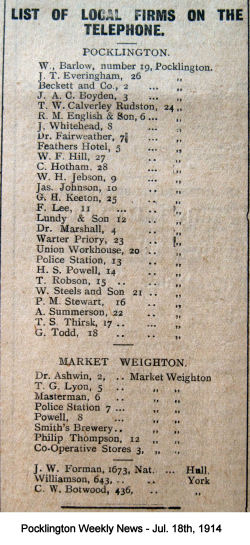 exchange for Market Weighton and Pocklington on 29th June 1910. The 19 subscribers listed for Pocklington and the 10 at Market Weighton could use their phones on week-days between 8am and 8pm and on Sundays between 8.30am to 10am, the hours of attendance at the Exchange. 1911 directory listed a further six Pocklington subscribers making 25 in all, but since that directory still indicated that the exchange "will be opened shortly" it is quite possible that it went to print in the late summer or autumn of 1910. exchange for Market Weighton and Pocklington on 29th June 1910. The 19 subscribers listed for Pocklington and the 10 at Market Weighton could use their phones on week-days between 8am and 8pm and on Sundays between 8.30am to 10am, the hours of attendance at the Exchange. 1911 directory listed a further six Pocklington subscribers making 25 in all, but since that directory still indicated that the exchange "will be opened shortly" it is quite possible that it went to print in the late summer or autumn of 1910.
"1" was the public call office at Pocklington Post Office but numbers 2 to 18 (Beckett & Co, Bankers to Todd George, Family Grocer) were allocated in alphabetical order. The nineteenth subscriber in the 1910 directory was Pocklington Union Workhouse (20) and it appears that it was decided it should have a phone after the first allocation of numbers had been made. W Barlow, Chemist (19) did not appear in the 1910 directory.
The 1910 directory urges people to subscribe by saying "To be in touch with YOUR FRIENDS, you must have THE TELEPHONE" adding, in smaller type "A necessity of up-to-date business organization". It is interesting to see just who were the initial Pocklington subscribers.
| Pocklington Subscribers |
|
|
| |
1910 |
1911 |
| Auctioneers & agl merchts |
1 |
1 |
| Bank |
1 |
1 |
| Chemist |
1 |
2 |
| Doctor |
2 |
2 |
| Flour Mill |
1 |
1 |
| Gentry |
1 |
3 |
| Hotel |
1 |
1 |
| Misc |
1 |
1 |
| Police |
1 |
1 |
| Public call office |
1 |
1 |
| Retail |
4 |
5 |
| Grammar School |
0 |
1 |
| Solicitor |
2 |
3 |
| Vet |
1 |
1 |
| Workhouse |
1 |
1 |
| |
Total |
19 |
25 |
Some might well have become subscribers as a matter of status - Mr Calverley-Rudston was chairman of the local magistrates and of the Pocklington School Governors. Perhaps too the telephone company felt it was important that he, like Lady Nunburnholme, should be seen to be on the phone. Allerthorpe is several miles from Pocklington and the Dowager Lady Nunburnholme's residence, Warter Priory, was further still. The solicitors no doubt felt there was a practical need for a telephone, though Mr Summerson, who got his in 1911, gave his home address rather than his office in Railway Street. It would also have had practical value to R M English & Sons, the auctioneers and agricultural merchants, and to Thirsks, the millers, but it is less easy to see why the retailers decided to take the plunge. Perhaps it was again a matter of prestige. Mr George Todd had purchased a generator and lit his shop by electricity in 1904. But although nearly all the commercial entries were amongst the 53 commercial advertisers in a local paper of 13th January 1912 only three listed their phone number, Dunn at the Feathers Hotel, Todd, the family grocer, and Lundy, the watch-maker. (2)
There are notable absentees, in particular the Railway Station. The Pocklington branch of Barclay & Company Ltd is not listed, nor are the fire brigade, John Whitehead, the stationer who produced the local newspaper, nor the Rev A T Fisher, the Vicar of Pocklington. (3)
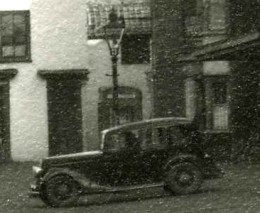 |
A public phone box in Market place, the postmark on the Postcard is 1947 |
Just as one can see pre enclosure award field boundaries within modern housing estates, so one finds that some phone numbers still survive embedded in the modern number. Market Weighton Post Office is 872201, Market Weighton Police Station 872207, Pocklington School 303125. Beckett & Co amalgamated with the then Westminster Bank in 1920 and the today the number of the National Westminster Bank at Pocklington is 302102. After the tragic death of his solicitor sons in the First World War, Thomas Robson's practice was acquired by H S Powell, who apparently kept both 14 and 15. Today 302115 is the number of Market Weighton Drainage Board, of which Mr Powell was at one time Clerk. Powell & Young retained 2114 but also acquired what was then 2113, no doubt abandoned by the Police for technical reasons when a new switchboard was installed. Most of the names listed in those early directories are now ghosts of the past. Warter Priory was demolished in 1972, Allerthorpe Hall has long since been converted into flats, Ivy Hall became Burnby Hall, but after Major P M Stewart died in 1962 Burnby Hall Gardens, and its outstanding water lilies, were opened to the public. Thankfully, Pocklington Workhouse is a thing of the past, and I think Lundy & Son, watch-makers, goldsmiths and opticians finally closed in the 1960s but Mr George Todd's shop in The Pavement is still a grocers, now with Mr John Atkinson's name over the window.
We now take the telephone so much for granted that it is difficult to assess the impact it made, especially when long distance automatic dialling came into general use. Still one wonders what Mr Powell would have made of the six lines that now come into his office in Pocklington, (plus one for the fax machine and a leased line for the computer.) Because it was many years before there was anything approaching general coverage, the impact must have been far more gradual than, for example, the introduction of fax, which swept into professional and commercial offices in months rather than years.
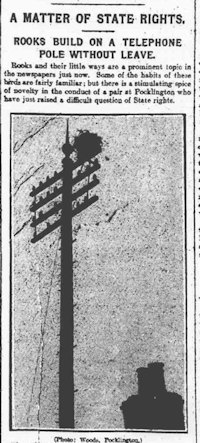 .JPEG) Besides being a pleasant diversion into the past, an analysis of early phone directories, particularly one linked to other records, can throw light on social and economic facets of the time. A single study, over only two years, is of course of very limited interest. Perhaps however, just as trade directories have come to be seen as valuable data sources, so early phone directories may prove a worthwhile subject for study. (4) Besides being a pleasant diversion into the past, an analysis of early phone directories, particularly one linked to other records, can throw light on social and economic facets of the time. A single study, over only two years, is of course of very limited interest. Perhaps however, just as trade directories have come to be seen as valuable data sources, so early phone directories may prove a worthwhile subject for study. (4)
Left: Yorkshire Evening Post - Tuesday 15 April 1913
Notes
1. It is a pleasure to acknowledge the assistance of BT Archives, Room G09, Telephone House, 2-4 Temple Avenue, London EC4Y OHL. The information in the following paragraph is gleaned from the booklet they supplied "Ringing the changes : a short history of telecommunications in the UK" (British Telecommunications 1993)
2. The Howdenshire Chronicle, POCKLINGTON WEEKLY NEWS, and Market Weighton Advertiser. Saturday January 13 1912. The choice of this issue was entirely arbitrary. As to this paper, and Pocklington generally, see David Neave's Pocklington 1660-1914 (1971) especially page 43
3. As to the absentees see Kellys Directory 1913.
4. Hull's first short lived exchange was established in the 1880s.By 1895 the Post Office Exchange had 52 subscribers and the National Telephone Company 742. (Victoria County History Yorks E R Vol I (Hull) pages 382-3). Beverley had exchange in 1896. (VCH Yorks E R Vol VI (Beverley) page 230). It is probably symptomatic of the level of interest in early telephones that the VCH for York merely remarks that a new exchange was built after 1945. (page 308)
Roger A Bellingham
Pocklington
1st July 1994
|

